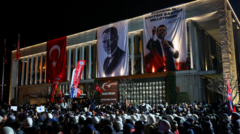In Turkey, widespread protests continue for a seventh night following the arrest of Istanbul Mayor Ekrem Imamoglu, resulting in over 1,400 detentions, including journalists and activists. The demonstrations, condemned by rights groups, express deeper frustrations with the current political climate and the government's actions against perceived dissent.
Protests Erupt Across Turkey Fueled by Political Arrests and Public Outrage

Protests Erupt Across Turkey Fueled by Political Arrests and Public Outrage
Thousands gather for ongoing protests against the arrest of Istanbul's opposition Mayor Ekrem Imamoglu, highlighting tensions in Turkish politics.
Thousands of demonstrators in Turkey have filled the streets for the seventh consecutive night, sparked by the controversial arrest of Istanbul Mayor Ekrem Imamoglu on corruption charges. Reports indicate that more than 1,400 individuals have been detained, among them students, journalists, and legal professionals. The protests, ignited last week, have emerged as a significant challenge to President Recep Tayyip Erdogan, who views Imamoglu as a central political adversary.
Imamoglu and his supporters claim that the corruption allegations are unfounded and politically motivated, a sentiment echoed by various human rights organizations and international observers, including the UN. President Erdogan, while addressing a group during a Ramadan gathering in Ankara, urged the public for restraint and asserted that those seeking chaos in the nation had no alternative path. He labelled the protests a futile endeavor.
In Istanbul, authorities have banned protests and closed select roads to uphold public safety, yet students from various universities have converged in Maçka Park, rallying under slogans like "government, resign!" as they marched through the Nisantasi district with riot police observing closely. Many young protesters concealed their identities with masks or scarves, mindful of potential repercussions from law enforcement.
The Turkish opposition party, the Republican People's Party (CHP), announced that its latest gathering outside Istanbul's City Hall would be its final nightly vigil, instead organizing a larger rally for Saturday to demand the release of Imamoglu and the cessation of detentions of local leaders. The call for transparency in legal proceedings and early elections resonates throughout the crowd, led by CHP officials urging public mobilization.
According to Turkey's interior minister, since the onset of protests, over 1,400 protesters have been arrested, with additional legal follow-ups planned. Amidst this unrest, authorities indicated that specific individuals are facing imminent courtroom appearances, asserting a hardline stance against actions deemed a threat to public order.
In response to the detentions of journalists covering the unrest, including AFP photographer Yasin Akgül, international press organizations have urged the Turkish government to reassess its approach towards media workers. Akgül, who was reported to be documenting the protests rather than participating, faced judicial actions that have drawn condemnation from pressure groups advocating for press freedom.
Despite the tumult surrounding Imamoglu's arrest, his candidacy for future political office remains intact unless a conviction occurs related to his current charges. Critics of President Erdogan’s two-decade governance raise questions about his intentions, suggesting that amendments to extend his rule beyond the constitutional limits may be considered.
The Ministry of Justice has defended the independence of Turkey's judiciary amidst accusations tying Erdogan to the crackdown on dissent, emphasizing its commitment to following due process. The escalating unrest and fervent calls for political change reveal a nation at a crossroads, grappling with deepening divisions and rising public discontent.





















